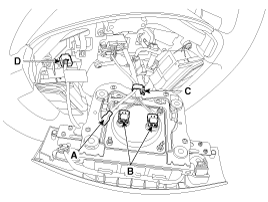 Hyundai Equus: Driver Airbag (DAB) Module and Clock Spring Repair procedures
Second generation VI (2009–2025) / Hyundai Equus VI 2009-2025 Service Manual / Restraint / Airbag Module / Driver Airbag (DAB) Module and Clock Spring Repair procedures
Hyundai Equus: Driver Airbag (DAB) Module and Clock Spring Repair procedures
Second generation VI (2009–2025) / Hyundai Equus VI 2009-2025 Service Manual / Restraint / Airbag Module / Driver Airbag (DAB) Module and Clock Spring Repair procedures
Second generation VI (2009–2025) / Hyundai Equus VI 2009-2025 Service Manual / Restraint / Airbag Module / Driver Airbag (DAB) Module and Clock Spring Repair procedures
| Removal |
| 1. |
Disconnect the battery negative cable and wait for at least three minutes before beginning work. |
| 2. |
Loosen the airbag module mounting bolts (2EA).
|
| 3. |
Remove the wiring fixing clip (C) and disconnect the horn connector (A).
Release the connector locking pin, then disconnect the driver airbag module connector (B).
Disconnect the steering wheel remote control switch connector (D).
|
| 4. |
Loosen the lock nut.
|
| 5. |
Remove the steering wheel (A) from the steering column shaft by using a SST (09561-11001).
|
| 6. |
Loosen the screw and then remove the steering column shroud (A).
|
| 7. |
Disconnect the clock spring and horn connector, then remove the clock spring (A).
|
| Inspection |
Driver Airbag (DAB)
If any improper parts are found during the following inspection, replace the airbag module with a new one.
Never attempt to measure the circuit resistance of the airbag
module (squib) even if you are using a specified tester. If the circuit
resistance is measured with a tester, accidental airbag deployment will
result in serious personal injury.
|
| 1. |
Check pad cover for dents, cracks or deformities. |
| 2. |
Check the airbag module for denting, cracking or deformation. |
| 3. |
Check hooks and connectors for damage, terminals for deformities, and harness for binds. |
| 4. |
Check airbag inflator case for dents, cracks or deformities.
|
| 5. |
Install the airbag module to the steering wheel to check the wheel alignment. |
Clock Spring
| 1. |
If any improper parts are found during inspection, replace the clock spring with a new one. |
| 2. |
Check connectors and protective tube for damage, and terminals for deformities.
|
| Installation |
| 1. |
Set the front tires straight-ahead. |
| 2. |
Turn the ignition switch OFF. |
| 3. |
Disconnect the battery negative cable from the battery and wait for at least three minutes before beginning the work. |
| 4. |
Connect the clock spring harness connector and horn harness connector to the clock spring. |
| 5. |
Assemble the neutral state clock spring.
|
| 6. |
If the neutral pin is removed or when re-assembling the clock
spring after removal, set the clock spring back to neutral by following
below steps.
|
| 7. |
Install the steering wheel column shroud and the steering wheel.
(Refer to Steering System - "Steering Column and Shaft") |
| 8. |
Install the steering wheel.
(Refer to Steering System - "Steering wheel") |
| 9. |
Connect the Driver Airbag (DAB) module connector and horn
connector, and then install the Driver Airbag (DAB) module on the
steering wheel. |
| 10. |
Install the driver airbag module. |
| 11. |
Connect the battery negative cable. |
| 12. |
After installing the airbag, confirm proper system operation :
|
 Driver Airbag (DAB) Module and Clock Spring Components and Components Location
Driver Airbag (DAB) Module and Clock Spring Components and Components Location
Components
1. Driver Airbag (DAB)2. Steering Wheel3. Clock Spring
...
 Passenger Airbag (PAB) Module Description and Operation
Passenger Airbag (PAB) Module Description and Operation
Description
The passenger airbag (PAB) is installed inside the crash pad
and protects the front passenger in the event of a frontal crash. The
SRSCM determines if and when to deploy the PAB.
...
See also:
ASCC/LDWS Mode (if equipped)
This mode displays the state of the Advanced Smart Cruise Control (ASCC) and
Lane Departure Warning System (LDWS).
❈ For more details, refer to "Advanced Smart Cruise Control (ASCC)&q ...
Spark plugs
Make sure to install new spark plugs of the correct heat range. ...
Hood Latch Release Handle Components and Components Location
Component Location
1. Hood latch release handle
...
Categories
Hyundai Equus Manuals
© 2011-2025 Copyright www.heqmanual.com















